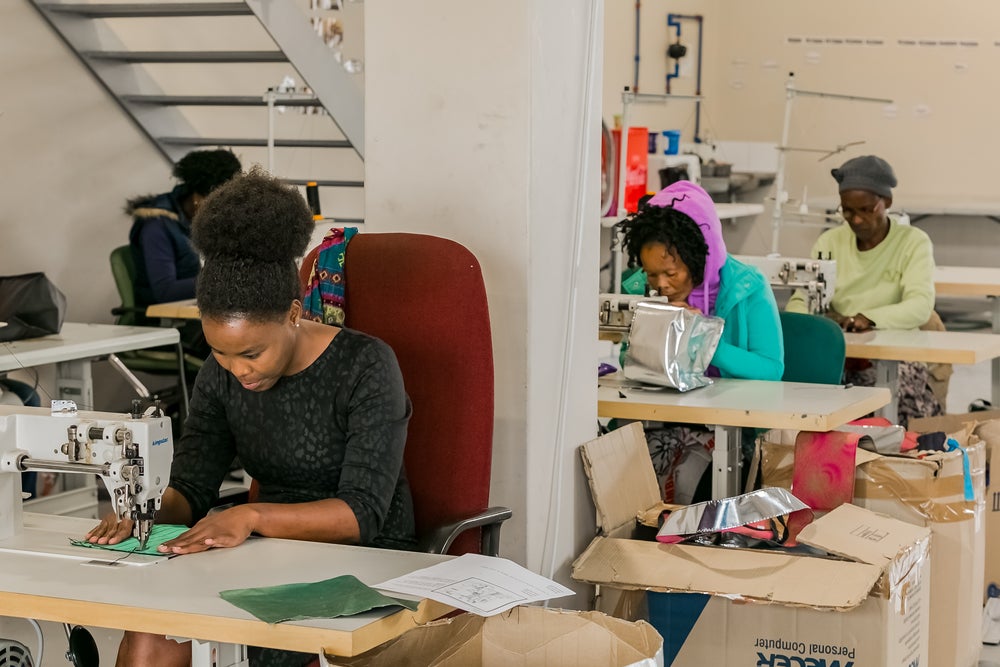
Part of an initiative that runs until March, a series of inspections were conducted in December last year in textile and garment factories located in Mandeni, KwaZulu Natal Province, approximately 80 km from Durban, South Africa.
The checkups allegedly uncovered a range of violations including excessively long 12-hour shifts, rampant occupational health and safety breaches, bathroom break restrictions and unsanitary conditions.
Some factories were found to be using unlabelled chemicals without proper personal protective equipment, and in some instances, these chemicals were placed in front of fire equipment. Blocked fire escapes were also identified, posing serious hazards in case of emergencies.
The inspections were said by the Department to be in adherence to standards set by the International Labor Organization (ILO) to ensure compliance on labour matters concerning working conditions, minimum wages, labour relations and occupational health and safety.
Department of Employment and Labour chief director of provincial operations Edward Khambula said the clothing and textile sector was struggling to meet standards of compliance with labour legislation.
Khambula said there is a collective agreement regulating the sector in the area of Mandeni, however, “once you fail to pay the National Minimum Wage we intervene.”
Factory wages were found to be significantly below the industry’s agreed-upon minimum standards set for garment and textile industries by the National Bargaining Council for the Clothing Manufacturing Industry, with some employers paying as low as R10 per hour (US$0.53).
The rates in the collective bargaining agreement were above the national minimum wage which is R25.42 per hour (US$1.40).
The Department’s chief inspector Milly Ruiters said the Department appeared to “leave no stone unturned.”
At the time of the blitz inspections, several employers attempted to “dupe” inspectors with excuses such as claiming they were not informed about the visits in an attempt to tinker with their records and some even attempted to assist their workers in eloping from the premises.
The Southern African Textile and Workers’ Union (SACTWU), an affiliate of the global union IndustriALL, revealed that some non-compliant factories were operating as unregistered cooperatives to sidestep national labour laws and collective bargaining agreements.
The department seemed to confirm this when an employer at the time admitted that their operation was a co-operative which was in the process of closing shop this week – which would have led to more than 50 job losses.
This could have allowed the factories to pay wages based on piece rates, weakening the efforts of unions to secure fair compensation for workers.
IndustriALL explained that by using unregistered cooperatives the factories were violating the cooperatives laws, undermining union strategies to leverage wages on collective agreements.
SACTWU reported that it had extended collective agreements to non-parties – those factories not represented in bargaining councils- to ensure workers receive living wages.
Patrick Mthembu, SACTWU’s provincial organiser for KwaZulu Natal, emphasised the union’s strategy of recruiting and organising workers to enable the declaration of labour disputes against offending factories.
Mthembu explained: “It is difficult to declare a dispute if the workers are not members of the union as this is part of the legal requirements to take up issues for conciliation, mediation, and arbitration.”
Paule France Ndessomin, IndustriALL regional secretary for Sub-Saharan Africa added: “Factory owners must respect and allow workers to enjoy the rights at work in the textile and garment factories.
“South African trade unions, including SACTWU, have fought hard for the enactment of the national labour laws and the ratification of international labour conventions on workers’ rights and collective bargaining and these gains must be protected through compliance.”
The Basic Conditions of Employment Act stipulates that inspections are conducted to investigate complaints, ensure compliance with working hours, leave, contracts, and wages, and promote international labour standards and fundamental rights at work.
This article was first published by IndustriALL.



